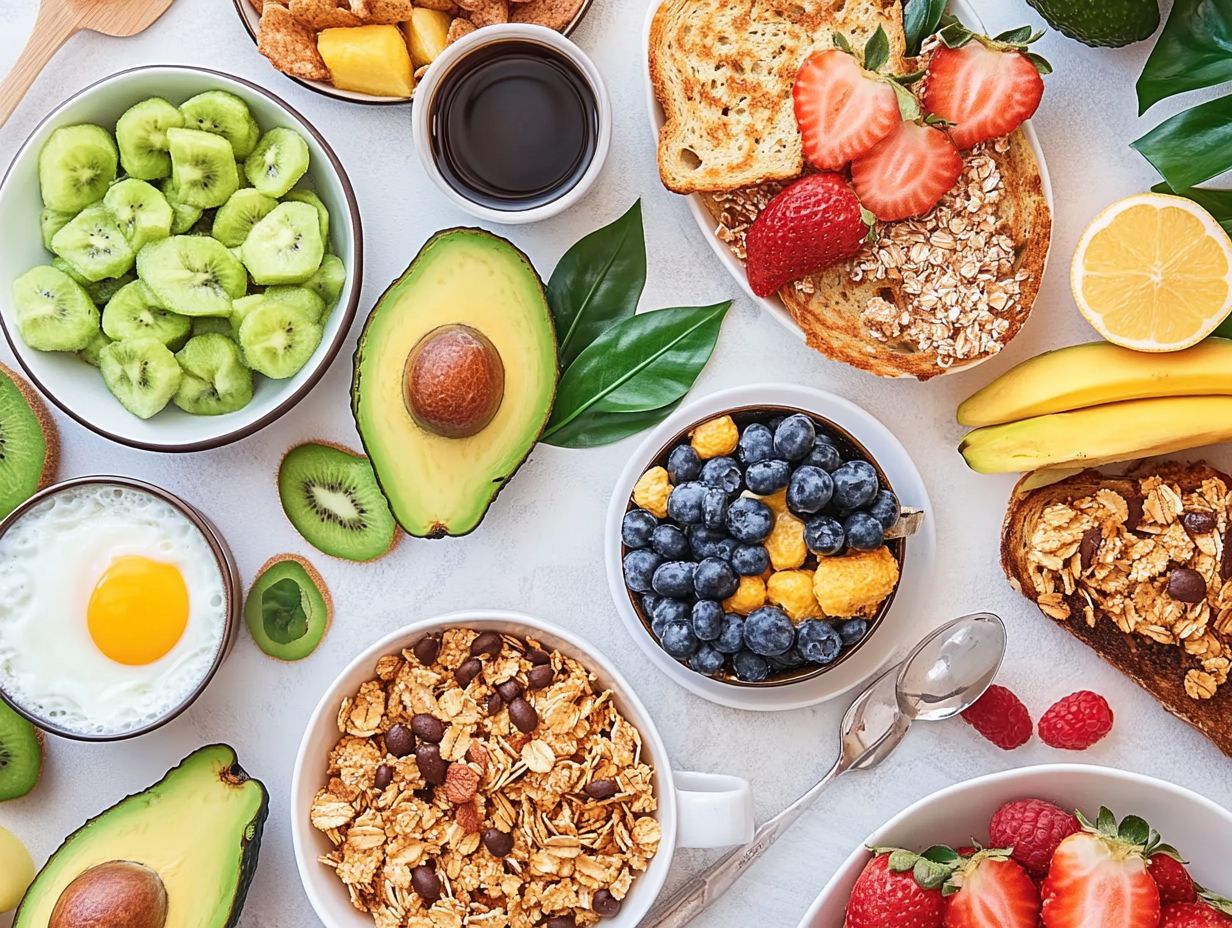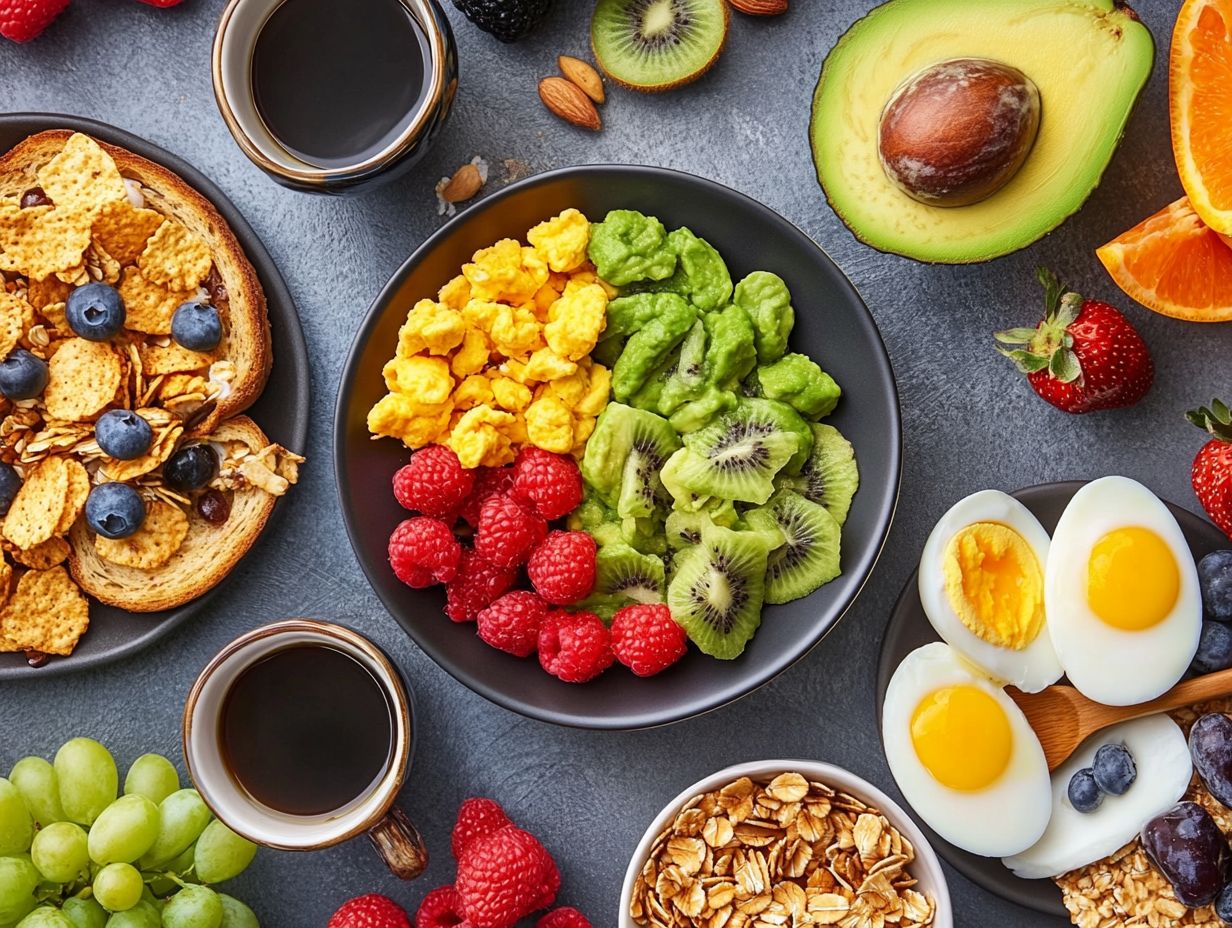10 Myths About Eating Breakfast
Breakfast has long been celebrated as the most important meal of the day. But how much merit does this widely held belief truly possess?
There are numerous myths surrounding this morning ritual. From worries about weight gain to debates over what constitutes the ideal breakfast, misconceptions abound.
This article delves into ten prevalent misconceptions about breakfast, examining its effects on metabolism, concentration, and overall health.
Whether you re a devoted breakfast enthusiast or someone who often skips it, grasping these insights can empower you to make more informed choices for a healthier lifestyle.
Contents
- Key Takeaways:
- 1. Skipping Breakfast Causes Weight Gain
- 2. Breakfast Is the Most Important Meal of the Day
- 3. Eating Breakfast Boosts Metabolism
- 4. Skipping Breakfast Leads to Overeating Later in the Day
- 5. Breakfast Should Be High in Carbs
- 6. Eating Breakfast Helps with Concentration and Productivity
- 7. Breakfast Foods Are Healthy Choices
- 8. Breakfast Should Be Eaten First Thing in the Morning
- 9. Skipping Breakfast Is Unhealthy
- 10. Breakfast Should Be a Large Meal
- What Are the Actual Benefits of Eating Breakfast?
- Frequently Asked Questions
Key Takeaways:

- Skipping breakfast doesn t guarantee weight gain.
- Breakfast isn’t crucial for everyone.
- A healthy breakfast enhances focus but doesn’t necessarily speed up metabolism.
1. Skipping Breakfast Causes Weight Gain
Numerous studies show that skipping breakfast can lead to weight gain and obesity. It significantly influences your hunger levels and prompts higher calorie intake later in the day.
This creates a cycle that can be detrimental to your health. Research indicates that when you regularly skip this vital meal, you might consume an additional 300 to 500 calories later on, which exacerbates your overall energy surplus.
This largely stems from the body s hunger hormones, like ghrelin, which can become unregulated when breakfast is omitted. This unregulated state often results in heightened cravings and impulsive food choices.
Missing breakfast may disrupt insulin sensitivity and increase the risk of metabolic issues. Understanding these mechanisms is essential for cultivating better health behaviors.
A consistent breakfast routine is not just about weight maintenance; it s also linked to improved mood and cognitive function throughout your day.
2. Breakfast Is the Most Important Meal of the Day
Breakfast is often recognized as the most important meal of the day. It plays a pivotal role in meeting your nutritional needs and enhancing cognitive performance throughout the morning.
Beginning your day with a balanced breakfast can significantly elevate your overall health. It jump-starts your metabolism and provides the essential energy required to navigate daily tasks effectively.
Nutritional authorities suggest incorporating a blend of carbohydrates, protein, and healthy fats to maintain steady blood sugar levels. This balance is crucial for sustained energy and mental clarity.
Research shows that those who regularly enjoy breakfast tend to exhibit better concentration, quicker problem-solving abilities, and an improved mood. This underscores breakfast’s vital role in boosting daily productivity.
In essence, making this meal a priority can truly set the stage for a healthier lifestyle.
3. Eating Breakfast Boosts Metabolism
Eating a nutritious breakfast can elevate your metabolism. It offers essential nutrients like protein and whole grains that help regulate energy expenditure and promote metabolic health.
This first meal of the day sets the tone for everything that follows, influencing both your physical performance and overall energy levels.
Research indicates that those who enjoy a well-balanced breakfast often experience heightened metabolic rates throughout the morning. This can lead to improved calorie burn, even while at rest.
A study published in the Journal of Nutrition revealed that breakfasts rich in protein stimulate increased thermogenesis, boosting your body’s energy use.
By incorporating healthy fats and fibers, you enhance feelings of fullness and support steady blood sugar levels. This ensures a sustained release of energy that keeps your metabolism balanced throughout the day.
In conclusion, understanding the myths surrounding breakfast can lead to healthier choices. Are you ready to unlock the secrets of breakfast for a healthier you?
4. Skipping Breakfast Leads to Overeating Later in the Day
Research suggests that when you skip breakfast, you often end up overeating later in the day. You might find yourself battling heightened hunger levels, which can steer you toward poor nutritional choices and a higher calorie intake.
By omitting breakfast, your body amplifies those hunger signals. This makes it tough to resist unhealthy snacks or larger portions at lunch and dinner. This pattern is especially noticeable among people who skip their morning meal, as they may unconsciously try to make up for the missed calories.
As a result, it s all too easy to reach for quick, processed options packed with sugar and fat, complicating your dietary goals. Without a nourishing start to your day, you may disrupt your metabolic functions, adding another layer to the problem. This can create a cycle of unhealthy eating habits that is challenging to break.
5. Breakfast Should Be High in Carbs
A breakfast rich in healthy carbs, especially from whole grains, is essential for giving you the energy boost needed to kickstart your day and keep your mind sharp.
When you opt for complex carbohydrates, you enjoy a steady stream of energy and support your mood and overall performance throughout the morning.
Consider these options:
- Oatmeal topped with fresh fruits provides fiber and vitamins to fuel your day!
- Whole grain toast adorned with creamy avocado offers healthy fats for sustained energy.
- A vibrant smoothie made with banana and spinach is packed with nutrients and hydration.
These choices are fantastic because they provide sustained energy, thanks to their high fiber content that helps regulate your blood sugar levels. By starting your day with these nutrient-packed foods, you can enhance your focus, elevate your sense of well-being, and set a positive tone for the hours that lie ahead.
6. Eating Breakfast Helps with Concentration and Productivity

Eating a balanced breakfast isn t just a routine; it s a strategic move that sharpens your concentration and boosts productivity. Nourishing your body with the right nutrients equips you to enhance cognitive performance throughout your morning activities.
Numerous studies underscore the advantages of a nutritious breakfast. People who eat this important meal tend to enjoy better memory retention and greater cognitive flexibility than those who skip it. Research shows that both children and adults experience heightened focus and improved decision-making abilities after fueling their bodies with wholesome foods.
Smart choices like whole grains, fruits, and proteins deliver vital vitamins and minerals while promoting sustained energy levels. When you focus on brain-boosting foods for breakfast, you prepare for a day full of mental clarity and efficiency.
7. Breakfast Foods Are Healthy Choices
Breakfast foods can be some of the healthiest choices you make, especially when they feature a delightful mix of fruits and vegetables alongside protein-packed options that boost your overall well-being.
Incorporating these diverse food groups elevates the flavor of your morning meal and ensures you re getting essential nutrients, setting you up to conquer the day ahead.
For instance, tossing in berries or bananas adds vital vitamins and fiber, while leafy greens like spinach can boost your iron intake. Pairing these with eggs, yogurt, or nuts provides the protein needed to support muscle health and keep your energy levels steady.
By prioritizing such nutritious breakfasts, you lay a solid foundation for a balanced diet, ultimately enhancing your health and vitality.
8. Breakfast Should Be Eaten First Thing in the Morning
To maximize the health benefits of your morning routine, make it a point to eat breakfast first thing. This practice not only jump-starts your metabolism but also sets a positive tone for the day ahead.
If you skip breakfast, you risk unstable blood sugar levels, which can lead to cravings later on and throw your overall well-being off balance.
Establishing a regular breakfast routine helps cultivate healthier eating habits throughout the day. Those who prioritize breakfast tend to make better food choices overall.
This consistent morning ritual fuels your body, stabilizes your mood, and fosters a sense of accomplishment, creating a ripple effect that positively influences your lifestyle choices.
Start making better breakfast choices today for a healthier tomorrow!
9. Skipping Breakfast Is Unhealthy
Skipping breakfast can lead to unhealthy consequences, including a higher risk of obesity and problems with how your body uses food for energy. It disrupts your body’s natural hunger and energy regulation systems.
Research shows that those who frequently skip this vital meal may experience a decline in overall health, especially regarding weight management. A study published in the Journal of Nutrition reveals that individuals who eat breakfast tend to maintain healthier body weights compared to those who don’t.
Studies link skipping breakfast to higher insulin resistance, which can lead to type 2 diabetes. Neglecting this essential meal may also increase your risk for heart disease due to elevated cholesterol levels and higher blood pressure.
So, prioritizing a balanced breakfast is essential for promoting optimal health and wellness. Why skip the meal that can power your day?
10. Breakfast Should Be a Large Meal
Breakfast deserves to be celebrated as a substantial meal, offering a significant portion of your daily calorie intake. A generous breakfast encourages healthier choices and sustains your energy throughout the day.
By prioritizing a hearty breakfast, you set the stage for smarter meal decisions later on. This meal is an opportunity to pack in essential nutrients and plays a vital role in regulating your appetite.
A larger breakfast can boost your energy levels, enhancing both your physical and mental performance. Plus, indulging in a filling breakfast can help curb cravings for unhealthy snacks.
This ultimately supports better weight management and enhances your overall health. Don’t miss out on the benefits of breakfast!
What Are the Actual Benefits of Eating Breakfast?
Eating breakfast offers a wealth of benefits, including enhanced cognitive performance and effective weight management. A nutritious morning meal is essential for a balanced diet.
Research shows that starting your day with breakfast leads to sharper focus and better problem-solving skills. Studies from Harvard and the American Journal of Clinical Nutrition reveal that breakfast eaters often excel academically.
Breakfast significantly influences your physical health; it jumpstarts your metabolism and helps regulate blood sugar levels. Experts recommend incorporating a blend of protein, whole grains, and healthy fats for sustained energy.
Ultimately, this fosters long-term wellness. So, make breakfast a priority!
What Are Some Healthy Breakfast Options?

- Oatmeal adorned with fresh berries and a sprinkle of nuts.
- A smoothie crafted with spinach, banana, and Greek yogurt.
- Overnight oats prepared the night before.
These nutritious choices do more than just fuel your body; they promote sustained mental clarity, allowing you to tackle the morning with focus and vitality.
How Can One Incorporate Breakfast into a Busy Schedule?
Incorporating breakfast into your busy schedule is possible with grab-and-go options and simple cooking preparations. Prioritizing meal planning on weekends can streamline your morning routine.
Options like overnight oats can be prepped in advance, offering a wholesome breakfast that’s easy to grab. Adding fruits, yogurt, or nut butter into smoothies creates a quick, balanced meal to kick-start your day.
On busy days, set reminders for a few minutes of prep the night before. This way, breakfast becomes an effortless habit instead of a rushed inconvenience.
What Are Some Common Misconceptions About Breakfast?
Common misconceptions about breakfast can often lead you down a path of unhealthy choices and missed opportunities for nutrition. One prevalent belief is that skipping breakfast is harmless.
Embracing this notion might contribute to irregular eating patterns, leaving you with imbalanced energy levels throughout the day. Many think that skipping that first meal can aid in weight loss, but research suggests otherwise. Neglecting breakfast can lead to overeating later on, effectively nullifying any potential benefits.
By skipping this crucial meal, you risk missing out on essential nutrients like fiber and protein, both vital for optimal health. Understanding why breakfast matters can transform your health and enable you to make more informed dietary decisions, ultimately enhancing your wellness and sustaining your energy levels throughout the day.
Is Skipping Breakfast Ever Okay?
While many advocate for breakfast, there are circumstances where skipping it can be acceptable. However, it s crucial to consider the health implications and choose dietary alternatives wisely.
For instance, if you re practicing intermittent fasting, skipping your morning meal might be part of a structured eating plan that allows you to enjoy food during specific windows. If you have certain health conditions, such as gastrointestinal issues, you might discover that a morning meal exacerbates your symptoms, leading to discomfort and bloating.
In these situations, being attuned to your body and its responses can help you make personalized dietary choices. It s essential to gather information and understand how different approaches can impact your overall wellbeing, ensuring that any decision to skip breakfast aligns seamlessly with your individual health needs and lifestyle choices.
What Are Some Alternatives to Traditional Breakfast Foods?
Exploring alternatives to traditional breakfast foods opens up a world of nutritious options tailored to diverse tastes and dietary needs. These inventive choices not only satisfy your cravings but also play a vital role in enhancing your overall health.
For instance, a smoothie crafted from leafy greens, fruits, and protein powder can provide a refreshing and filling meal, brimming with essential vitamins.
A yogurt bowl adorned with seeds, nuts, and berries introduces delightful textures and delivers a well-rounded source of calcium and antioxidants.
If you’re busy in the morning, protein bars made with wholesome ingredients offer an excellent grab-and-go solution. These substitutes align seamlessly with nutritional guidelines, incorporating essential nutrients while steering clear of excess sugars and unhealthy fats.
Frequently Asked Questions
What are the top 10 myths about eating breakfast?

The top 10 myths about eating breakfast are: it’s the most important meal of the day, skipping it leads to weight gain, breakfast should only be sweet, breakfast is just for kids, coffee counts as a meal, skipping breakfast saves time, breakfast should be eaten first thing in the morning, breakfast should be a large meal, cereal is the only healthy breakfast option, and breakfast should always be eaten at home.
Is breakfast really the most important meal of the day?
While breakfast is important, it’s not necessarily the most important meal of the day. Every meal matters, and skipping any can have negative effects on your health. What’s most important is ensuring you get a balanced and nutritious diet throughout the day.
Will skipping breakfast lead to weight gain?
There is no evidence to suggest that skipping breakfast leads to weight gain. Weight gain is determined by overall calorie intake and expenditure throughout the day. Eating a balanced and nutritious diet, regardless of when you eat your meals, is key for maintaining a healthy weight.
Are sweet foods the only acceptable breakfast options?
No, breakfast can include a variety of foods, not just sweet options. Whole grains, fruits, vegetables, and protein sources can all make great breakfast choices. It’s important to have a balance of nutrients to start your day off right.
Is breakfast only important for kids?
Breakfast is essential for everyone, not just kids! It fuels your body and mind, helping you seize the day.
Adults need to carve out time for breakfast too.
Does coffee count as breakfast?
No, coffee can’t replace a balanced breakfast. It gives a quick energy boost, but pairing it with a nutritious meal ensures lasting energy and health benefits.






